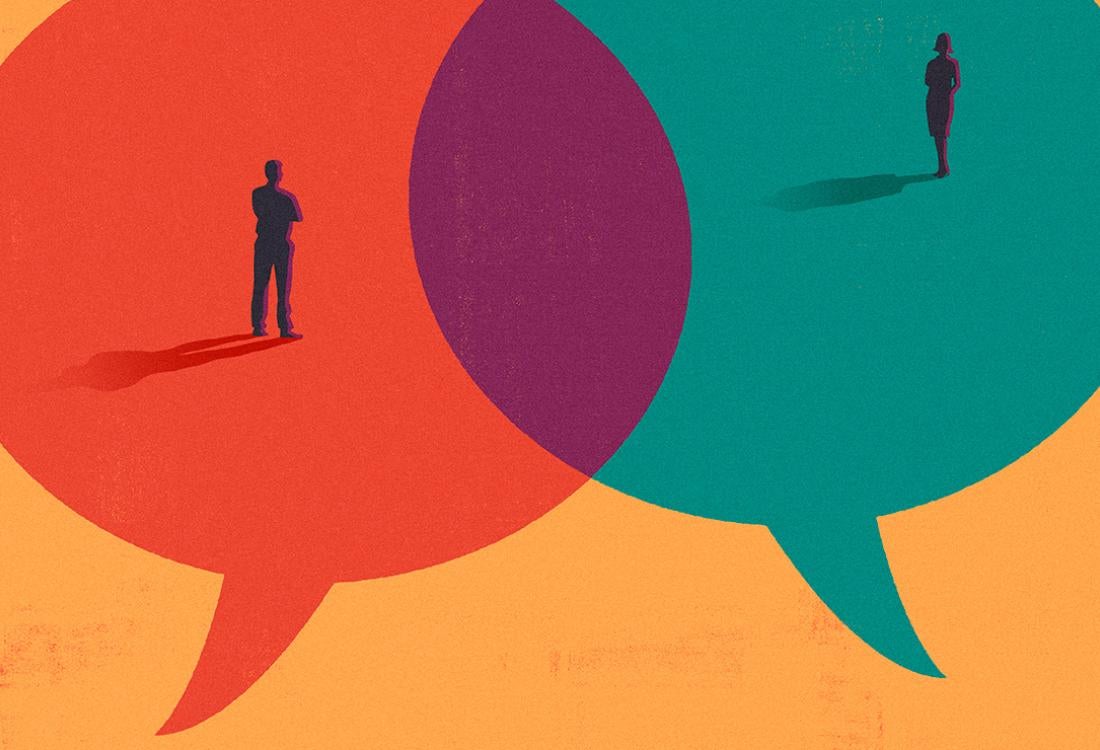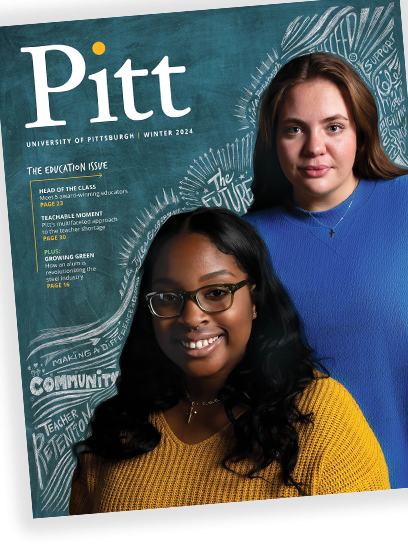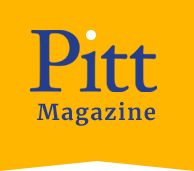
It’s no secret that many people feel a rising sense of conflict in their communities these days. According to a 2023 poll conducted by market research and data analytics firm YouGov, two-thirds of Americans believe the nation is more divided than usual.
College campuses haven’t escaped that sense of discord — yet their unique environment of academic exchange has the potential to create platforms for productive and meaningful discussion amid differences. That’s because universities are, by their very nature, collaborative places. They bring together people from distinct backgrounds, identities, faith systems and political views who all share the pursuit of knowledge as a common goal.
But contention can come with diversity. As communities converge in classrooms, residence halls and the public square, they are expected to remain respectful toward each other, despite often possessing conflicting, even polarizing, views.
At Pitt, the academic community aims to achieve understanding through shared differences of perspective. The Year of Discourse and Dialogue, which unfolded over the 2023-24 academic year, helped to foster this goal and lay the foundation for ongoing work.
Led by the Office of the Provost, the Office for Equity, Diversity and Inclusion, and the Graduate School of Public and International Affairs, the initiative established campus programming and provided grant funding to support interdisciplinary projects working to ensure the University is a place where everyone can “challenge ideas, seek truth, create new knowledge and examine their biases and assumptions.”
Among the grant recipients were faculty members Abdesalam Soudi, a teaching associate professor of linguistics in the Kenneth P. Dietrich School of Arts and Sciences, and Ann Sinsheimer, a professor of legal writing and associate dean for equity and inclusive excellence in the School of Law. Soudi led a project that examined the roles compassion and language can play in civil discourse and the humanities in particular. Sinsheimer, meanwhile, designed a workshop on a peer-to-peer pilot program meant to encourage a deeper understanding of rights of expression.
The professors recently sat down with Clyde Wilson Pickett, Pitt’s vice chancellor for equity, diversity and inclusion and co-chair of the Year of Discourse and Dialogue committee. They discussed the role of open and courteous exchange of ideas on college campuses — and how to channel that same spirit into your next disagreement, whether it occurs in an internet comment section or around the family dinner table.
Clyde Wilson Pickett: Why is it important to curate opportunities to have difficult discussion and dialogue in places of learning?
Ann Sinsheimer: Students want to have these conversations. They know what is happening and feel the tensions and conflicts in the world around them. It’s about how we build trust in these spaces because students might not always feel safe to fully express themselves. We can use these spaces to build connections, to inform, to provide vocabulary so people can talk with one another across differences. Too often, they don’t know how to gather information on conflict without being offensive. Much of it is because many of us tend to be conflict averse. I know in law, we’re training people to speak rationally, but many topics have emotional components. It’s not comfortable in our culture to have conflict sometimes.
Abdesalam Soudi: I always ask, “Why does it even have to be difficult to begin with?” I think it’s because we’re not confronted with many opportunities in our upbringing and in our early education to learn to collaborate when we hold different views. So, I think the Year of Discourse and Dialogue is a timely event, especially given recent international conflicts, because those conversations spill over onto campus, and we find ourselves having to talk about it.
Pickett: It seems that we often amplify our differences when having discussions. Why is that?
Soudi: That’s just the nature of life. Life frequently presents more opportunities to divide us than unite us. The goal is to try to resist that division and remain committed to efforts that promote unity and understanding.
Pickett: In higher education, there is often space to discuss current world events — many of which are complex and contentious. What are some key components to ensuring these conversations are productive?
Soudi: Higher education must teach things like compassion, and we need to think on how we can invite compassion into the classroom. A campus, like society, represents diverse political and world views, but at the end of the day, we must create opportunities to remind people to celebrate our shared humanity. Once people are more compassionate, I believe they will be more respectful of difference. Higher education can educate and train — part of that is fostering cultural sensitivity and cultural humility, some of the core defining aspects of the humanities.
Sinsheimer: If we practice more humility, that’ll bring us more and different solutions than we’d necessarily see if we stayed in our own silos. How often do we jump to conclusions? We do that when there’s ambiguity in a space — we just fill in with some intent that we don’t actually know. So, if we can have conversations where we pause and say, “What do you mean by that?” If there’s some genuine curiosity, then it might lower the temperature.
Pickett: At Pitt, we know it’s okay to disagree, but we also emphasize that disagreement should not negate our human connection to one another. In your opinion, what’s the best way to ensure that amid debate we never lose sight of each other’s humanity?
Soudi: There is no universal rule on how to conduct a conversation. It depends on the situation, on the setting, who is there, who is participating, the power differentials that might be in the space and why people are gathering. So, the timing, the context, the relationship between participants really matters in making those decisions about how we should proceed. But regardless of context or the nature of the debate or topic, our shared humanity should always remain our base in every conversational turn, even when agreeing or disagreeing.
Sinsheimer: I agree. The ground rules are important, and there has to be a foundation that builds a community, that builds trust. You can't just walk up to somebody to whom you haven’t ever said more than “how are you?” to and start a [meaningful] conversation about the Middle East. I mean, there has to be some scaffolding to get there. And I think that’s something the University could provide through practice.
Pickett: What’s something you find very important to facilitating civil discourse and encouraging the community to be a part of these conversations?
Sinsheimer: It’s important that we have positive intentions. People need to come into a space or into a conversation with the intention of wanting to understand, [not simply tearing the other side down].
Pickett: We often hear that people have a right to express themselves, which is true, of course. But there are responsibilities that come with free expression. How do you see those responsibilities impacting open discussion?
Soudi: Again, context matters. Generally, I like to promote what I call mindful language because sometimes, at the end of the day, people get confused about what’s appropriate. It’s something I don’t take for granted, as I think opportunities to put mindful language to good use are important. Also, sometimes people recognize we have all these common values, these threads of humanity, compassion and empathy, all these shared feelings toward each other — but sometimes, somehow, people put those aside and forget them. It’s important to continuously humanize our experiences and our conversations.
Pickett: How do you feel about the future of discourse and dialogue on campus and in society?
Sinsheimer: I feel very optimistic that these efforts will continue to promote a culture at Pitt where students feel safe engaging in conversation and voicing a range of opinions. I also recognize creating a campus culture that values discourse and dialogue takes sustained effort. We have plenty of work to do, and we are ready to do it.
Soudi: These types of efforts are good training for our community. They help to train people to appreciate the views of others and to enhance our global understanding — efforts that unite us and brings us together.



